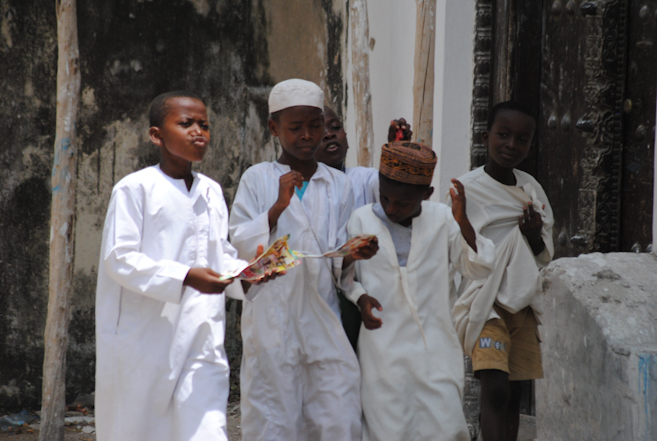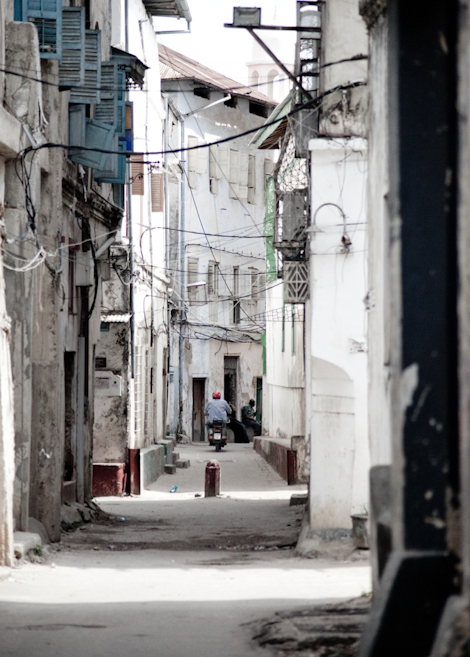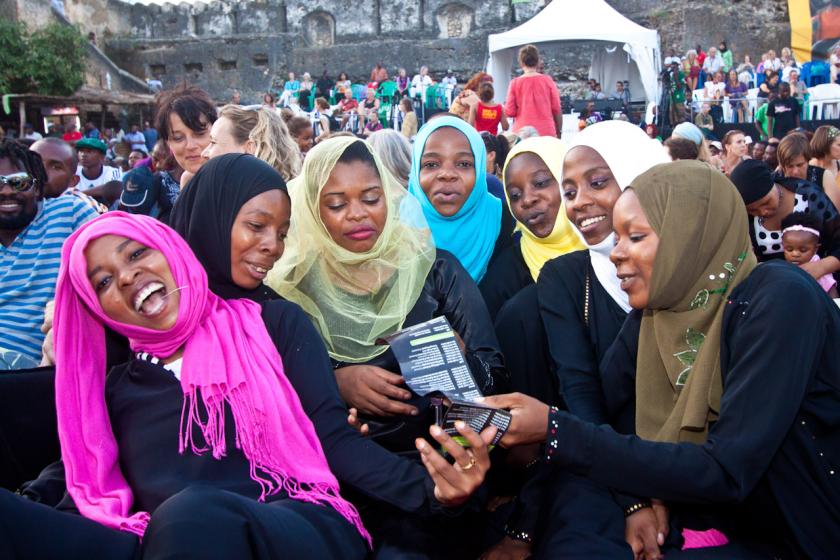“When I first came to Zanzibar I was expecting there to be a lot of local music in local cafés and bars on the radio. In reality it was the Spice Girls or "Barbie Girl". It was so disappointing, the state of the local music scene. Everyone was listening to soulless foreign music, American hip hop and gangsta rap, loud and angry and very foreign to the culture. It seemed people just weren’t interested in all the wonderful local music.”
Yusuf Mahmoud talks with considered precision. There’s a whir of generators and heavy machinery going on in the background - the new port in Zanzibar is being assembled before us. Wind in the palm trees is interrupting the tape recorder. He stares thoughtfully out across the balcony and then tries not to chuckle. “I do love my life here, 13 years later, the Indian Ocean just here in front of us, fresh pilipili perch to eat, really friendly people, a sense I am part of something, that through Sauti za Busara music festival we’ve helped Zanzibaris to take their own music more seriously, to value it.”
Zanzibar is also conservative, and highly contradictory: the tension between tradition and change plays out in microcosm
His bonne humeur is somewhat surprising, given the litany of challenges he’s faced to get the Sauti za Busara (Sounds of Wisdom) music festival up and running. As he says, “Every year leading up to the festival in February, there’s 99 minor crises and one really major one.” From bureaucratic hurdles to cultural sensitivities, and a panoply of niggles in between, it’s not been a smooth ride. In January 1998, when Yusuf Mahmoud arrived in Zanzibar (dressed in a puffa jacket, fresh out of Brixton and a freezing winter) he didn’t expect to stay more than half a year. He was here on a short-term VSO placement to work on the first edition of the Zanzibar International Film Festival, having developed a successful career with the Anti-Apartheid Movement (AAM) in the Eighties in Britain. This was a time in Britain when "world music" was new and emerging: mainstream knowledge of – and airtime for - music from beyond Europe was limited, and the nascent scene was dominated by West African artists from Senegal, Mali and Nigeria. The absence of Facebook and other social media, plus the real technical difficulties of producing and distributing music in Africa (some of these problems still remain for smaller artists) meant the flow of African music to Europe was pretty tiny.
 Yusuf was in Zanzibar to work on a film festival, and then go home. Not to find new bands, change the way music is listened to and appreciated in Africa, make a significant impact on the economic scene, and reinstate a sense of pride and confidence in Zanzibaris and their culture. (Pictured right: young boys return from madrassa. Photo by Salhim Shao.)
Yusuf was in Zanzibar to work on a film festival, and then go home. Not to find new bands, change the way music is listened to and appreciated in Africa, make a significant impact on the economic scene, and reinstate a sense of pride and confidence in Zanzibaris and their culture. (Pictured right: young boys return from madrassa. Photo by Salhim Shao.)
That is, though, how it sort of panned out. Having been raised as Steve, a lapsed Christian, in Cheltenham, he embraced Islam shortly after a brief visit to the Gambia in 1989. “The idea of living in a 98 per cent Muslim country (Zanzibar is Muslim) did appeal; I had been living as a minority in England, and I was intrigued and interested to live in a place where I had a spiritual connection.” Yusuf was working on the film festival when he was approached and asked to find musicians to contribute to the event, which was due to start in 10 days’ time. Somehow, through his connections, the fact that he’s so well liked and was clearly trying to promote something worthwhile, he was able to cobble together a party. Five hundred people came to the first music show, which included Remmy Ongala, Tatu Nane and the now legendary Kwanza Unit. It was held in the Old Fort (where the festival continues to take place). It helped that the event coincided with Nelson Mandela’s 80th birthday.
The parade from the 2011 Busara Festival (click on the images to enlarge)
[bg|/NEW_MUSIC/Jasper_Rees/Busara2]
Yusuf is undoubtedly likeable: we sit perched on old dhows on the edge of a working beach: fishermen gut fish and the ferry unloads its TVs, motorbikes, Chinese plastic buckets, crates of chickens and passengers, as people come up to shake his hand. “Niko busy!” he grins. He underplays his knowledge, and humility is his by-word. But clearly, charm and knowledge are not nearly sufficient for making a music festival attract audiences, artists and funding. Finding the music to put in the early festivals was one of many challenges; here in East Africa the circulation of local music was sparse. Bands were just too broke to afford to get into a studio to cut a CD. Then, and still now, most local bands record on tape cassette. National radio stations didn’t air, and still don’t air, the more edgy locally produced stuff.
 Zanzibar is also conservative, and highly contradictory: with its Sufi, Sunni and Bohora Muslims, it’s caught on the cusp of modernity, and the tension between tradition and change plays out in microcosm. One million tourists per year equals the number of citizens on the island. The fusion between Northern tourism and African/Omani culture is not always comfortable. On the beaches European tourists sip cocktails in micro bikinis, cheek by jowl with fishermen returning from 12-hour night shifts. Women in complete burkah (nicknamed ninjas by locals) sport jazzed-up mobile phones which they constantly jab at with swift fingers. The majority of the population lives on less than a dollar a day and works in farming or fishing. Clean water and electricity are still luxuries, not the norm. Work, even in the tourism industry, is hard to come by, as many Zanzibaris lack relevant experience and English-language skills. Women are expected to be sexually and socially demure, yet one of Zanzibar’s most famous daughters is 97-year-old Bi Kidude, a singer and drummer famed for her raucous melodies and suggestive lyrics. There’s a tenet of Islam, and some conservative imams on the island, that associate music with fornication, alcohol and malign Western influences - none of which are welcome. (Pictured above: Forodhani Gardens. Photo by David Murphy.)
Zanzibar is also conservative, and highly contradictory: with its Sufi, Sunni and Bohora Muslims, it’s caught on the cusp of modernity, and the tension between tradition and change plays out in microcosm. One million tourists per year equals the number of citizens on the island. The fusion between Northern tourism and African/Omani culture is not always comfortable. On the beaches European tourists sip cocktails in micro bikinis, cheek by jowl with fishermen returning from 12-hour night shifts. Women in complete burkah (nicknamed ninjas by locals) sport jazzed-up mobile phones which they constantly jab at with swift fingers. The majority of the population lives on less than a dollar a day and works in farming or fishing. Clean water and electricity are still luxuries, not the norm. Work, even in the tourism industry, is hard to come by, as many Zanzibaris lack relevant experience and English-language skills. Women are expected to be sexually and socially demure, yet one of Zanzibar’s most famous daughters is 97-year-old Bi Kidude, a singer and drummer famed for her raucous melodies and suggestive lyrics. There’s a tenet of Islam, and some conservative imams on the island, that associate music with fornication, alcohol and malign Western influences - none of which are welcome. (Pictured above: Forodhani Gardens. Photo by David Murphy.)
Says Yusuf: “There’s this music called mchiriku; it has a really bad reputation in Tanzania - dreadlocks, alcohol, cannabis; the musicians are thought of as thieves and hooligans… We found this mchiriku band called Jagwa Music, when we first put them on at the festival in 2005 they had about 10 cassettes releases, but they still don’t have any CDs out! The first show they did was really theatrical, guys falling over, becoming zombies, a guy would come with a bicycle pump and pump them to life, they did robot dances and then go into a frenzy. Meantime, the instrumentation was a CASIO keyboard that kids would play on, this would be a constant drone, with sticks beating out a rhythm on a stool. But it was hynoptic, many people loved it. This group were invited to performed at WOMEX (the world music expo) in Gateshead, UK, Roskilde Festival in Denmark and so on. They’ve had a lot of international interest; we’ve put the music in the spotlight, yet Jagwa Music are never played on Tanzanian radio, despite their huge popularity!”
Audiences enjoy the 2011 Busara Festival (click on the images to enlarge)
[bg|/NEW_MUSIC/Jasper_Rees/Busara1]
Busara has worked a sort of alchemy: it’s obvious local people love the festival (see gallery above). It’s deliberately brought together political factions, old and young, tourists and citizens to enjoy everything from traditional music from the villages to Sufi music, West African kora, Swahili hip hop, classical taarab orchestras to jostling township tunes. The small music scene is being revived in Tanzania and Zanzibar. In the Sixties and Seventies there was a thriving scene of different genres, including classical taarab, rumba dance bands and jazz music, with Zanzibar fashions leading to the soubriquet “the Paris of Africa”. These diverse styles, combining Egyptian, Indian and Omani influences used the oud (similar to a lute), violins, ney, accordion, cello and a variety of percussion. Music was woven into daily life: the best place to hear local musicians was at weddings, kitchen parties (a women’s-only affair preceding the wedding where ngoma drumming and sexual dancing takes place) and boys’ circumcision rituals. Encroaching tourism, Western pop music, the desire to be modern, and lack of money to pay musicians has seen a decline in these cultural rituals.
This is a deeply caring culture, driven by empathy and humanity, not consumerism
Says Yusuf: “In the early days actually finding contacts for the bands to play at the festival was a real job. It was a kitchen table affair, we’d go out, ask friends or taxi drivers who the good local bands were, or just check out the local bars in the poorer suburban areas in Dar es Salaam, and hope we’d get lucky. I had good contacts to start with, musicians like Dr Remmy Ongala and Dr Hukwe Zawose [both now deceased], from co-ordinating music festivals in the UK, working with WOMAD, Beat the Border and the AAM. I remember one trip: I was staying in this small guest house, somewhere in Dar, and having a cigarette on the roof, just looking at the sky. The laundry guy came up and as he was taking down the washing off the line, we got chatting, and I asked him if he’d heard of this band I’d been trying to track down called Katapila, aka Sangula. It turns out he was the bandleader! They’re this really imaginative group of people - one dancer plays two flutes at the same time (through his nostrils), real funky bass lines and amazing percussion. You know these guys were totally self-taught, but they played at the Busara festival, the BBC World Routes crew were there doing interviews, there was a sense of playing real Tanzanian music, for real Tanzanians, a lot of excitement and the crowd loved it!”
The festival is still very much a local affair, with people like Juma, a barber, asking to join the team as a stage runner, and Stellah, a waitress, joining as an office assistant. Juma is now the chief stage manager, in charge of a small local team that runs the venue backstage and keeps the shows running to time. He is due to get international training, while Stellah is now office manager and co-ordinates the festival ticketing and merchandise. The intention has always been, and remains, to create jobs, provide know-how and training for East Africa, and sustainably to manage the fragile balance between foreign visitors and the local community.
 Yusuf and I wander round the local streets of Stone Town, the capital of Zanzibar (pictured right; photo by David Murphy), and his home for the last 13 years. “DJ Yusuf! You’ve forgotten us! Where have you been?” local port workers, taxi drivers and informal workers greet him exuberantly. It can take an hour to make the 10-minute walk from his home to the town, such is the necessity to greet everyone, ask about business, family life and ongoing news. “It helps that I know the street language, understand methali [proverbs, metaphors], and that I am very much part of this community. When people ask how it’s going, it’s a genuine question, they want the whole story, a two-word reply is simply never enough. This is a deeply caring culture, driven by empathy and humanity, not consumerism.”
Yusuf and I wander round the local streets of Stone Town, the capital of Zanzibar (pictured right; photo by David Murphy), and his home for the last 13 years. “DJ Yusuf! You’ve forgotten us! Where have you been?” local port workers, taxi drivers and informal workers greet him exuberantly. It can take an hour to make the 10-minute walk from his home to the town, such is the necessity to greet everyone, ask about business, family life and ongoing news. “It helps that I know the street language, understand methali [proverbs, metaphors], and that I am very much part of this community. When people ask how it’s going, it’s a genuine question, they want the whole story, a two-word reply is simply never enough. This is a deeply caring culture, driven by empathy and humanity, not consumerism.”
Sauti za Busara now has its own technical kit, including stage, lighting, sound equipment, a programme to train sound technicians, a dedicated programme to increase opportunities for the local workforce, and an ever-increasing throng of musicians from around the world who are keen to perform at Africa’s leading music festival.
Despite its obvious achievements, keeping a tight focus on the festival, and sponsorship, still remains an issue. During Sauti za Busara all Stone Town’s hotel rooms are full, local restaurants, tour guides and taxi drivers all benefit from the 15,000-plus visitors each February. For one week the capital, a UNESCO site, is reverberating with South African, East African, Norwegian, American, Japanese and local Zanzibari voices, all mingling. “I still love African music, I am constantly surprised by new and exciting sounds from all over this beautiful continent. That’s what drives me, I love sharing this music with others. Whether as a DJ or co-ordinating a festival. There’s something about music that is hard to put into words. I can’t imagine living in a world where there is no music; it gives me nourishment, soul food.” Yusuf pauses, but he can’t help a bit of giggle.
Musicians perform at the 2011 Busara Music Festival (click on the images to enlarge)
- Bi Kidude with Mohamed Ilyas Nyota Zameremeta, Zanzibar (Photo by Peter Bennett)
- Black Roots, Zanzibar (David Murphy)
- Christine Salem Reunion (Peter Bennett)
- Cross Border, Zanzibar (David Murphy)
- Jahazi Modern Taarab, Tanzania (Eirik Folkedal)
- Maulidi ya Homu ya Mtendeni, Zanzibar (Anoop Singh)
- Percussion Discussion Afrika, Uganda (Anoop Singh)
- Sukiafrica Sukiyaki Allstars (Eirik Foldedal)
- Swahili Encounters (Peter Bennett)
- Orchestre Poly Rythmo de Cotonou, Benin (Peter Bennett)
[bg|/NEW_MUSIC/Jasper_Rees/Busara3]
- The ninth Sauti za Busara takes place in Zanzibar from 8-12 February, 2012
- Listen again to Yusuf Mahmoud being interviewed in Musical Migrants for BBC Radio 4
Watch musical highlights from the 2010 Busara Festival















Add comment